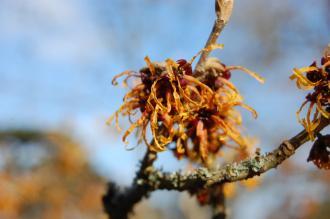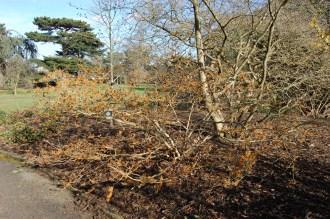
Hamamelis mollis Flower (08/02/2015, Kew Gardens, London)
Position: Sun to dappled shade
Flowering period: Late winter
Soil: Moist, well drained
Eventual Height: 8m
Eventual Spread: 8m
Hardiness: 5a, 5b, 6a, 6b, 7a, 7b, 8a, 8b
Family: Hamamelidaceae
Hamamelis mollis is a deciduous shrub with a spreading, bushy habit. Its dark green leaves are oval with serrate margins, up to 15cm long and 10cm broad. Its leaves turn yellow in autumn before they fall. Its fragrant yellow flowers appear in clusters, have orange center and appear before its leaves. Its petals are ribbon like and up to 15mm long. The fruit is a two part capsule which is up to 12mm long.
Hamamelis mollis, commonly known as Chinese Witch Hazel, is native to central and eastern China. In its native habitat it grows in thickets and forests. Subjective research has been carried out on the relative fragrance and leaf retention of various Hamamelis species and varieties by the curators of Scott Arboretum, unfortunately the species in not on this list.
The etymological root of the binomial name Hamamelis is derived from the Greek amamelis ‘a tree with pear like fruits’. Mollis is from the Latin meaning ‘soft’.

Hamamelis mollis (08/02/2015, Kew Gardens, London)
The landscape architect may find Hamamelis mollis useful in dappled shade locations as a small tree with fragrant late winter flowers and attractive autumn leaf color.
Ecologically, Hamamelis mollis attracts members of the Lepidoptera family which includes butterflies and moths.
Hamamelis mollis prefers moist, fertile, well-drained soils. It tolerates most pH of soil, although it prefers neutral to acidic soils.
Hamamelis mollis requires little maintenance.

